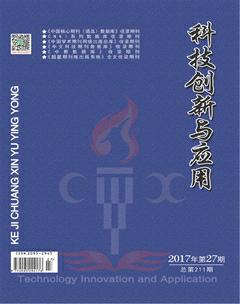土壤含水率測量技術和介電常數影響因素分析
徐爽
摘 要:土壤含水率的測量方法多種多種,其中基于介電常數的方法廣泛應用于農林業墑情和工程建設中。通過對含水率、溫度、干密度、質地、有機質含量、含鹽量以及測試頻率等因素的分析,總結了各因素對土壤介電常數的影響。
關鍵詞:土壤;含水率;介電常數
中圖分類號:S15 文獻標志碼:A 文章編號:2095-2945(2017)27-0034-02
1 概述
土壤含水率的變化對于農林業墑情預判以及工程建設中凍害防治具有重要意義。通常,測定含水率通過將土樣取回實驗室,在105℃的高溫下烘干的方法計算得到質量含水率。該方法的準確性較高,尤其對于黏粒含量不大的土類。但另一方面,由于需要現場采集樣本,并考慮到中途的各種試驗環節,往往費時費力,不便于快速確定土壤含水率。隨著科學技術的發展,目前市場上出現了基于土壤介電特性的水分傳感器,能夠在很短時間內測出土樣的體積含水率(?茲),并且具備了一定的測量精度。其中最常見的有頻域反射(FDR)和時域反射(TDR)傳感器。FDR是基于電容技術,在某一頻率下,將土壤介電常數(?著)進行實虛部分解,然后將其中的實部換算為土壤?茲。TDR法依據電磁波沿探針傳播的速度與周圍土壤?著平方根成正比的理論,測出?著,再轉換為?茲。可以看到,兩者都是首先測出被測土樣的?著,再將其值帶入相關經驗公式,轉換成?茲的方法實現。因此?著無疑成為一個很關鍵的指標。早些時候,研究者大多認為土壤?著大小幾乎只受到?茲的影響,而土壤其他因素對含水率測量結果的影響可以忽略。但隨著相關研究的進一步開展,科研人員發現除了體積含水率之外,溫度、干密度(容重)、土壤質地、有機質含量、含鹽量以及測試頻率等因素都會對?著產生較大的影響,并對?茲的測量結果帶來較大誤差。本文就前人的研究結果對影響土壤?著的各種因素進行分析總結。
2 不同因素對介電常數的影響
2.1 體積含水率
在20℃時,土壤中液體的介電常數值約為80,固體顆粒為3-5之間,而氣態物質則僅為1左右,所以?茲的大小幾乎成為決定土壤?著的最大因素。尤其在砂土,碎石土等黏粒含量較小的土質中,?茲與?著往往形成較高決定系數的三次多項式關系。所以,目前絕大多數TDR或FDR傳感器都通過擬合公式將測得的?著轉化為?茲。
2.2 溫度
?著表征介電質極化能力強弱,常溫常壓下,液態水的?著與溫度成一定的函數關系,而在同樣環境中,土骨架及其空氣的?著變化量要小很多,所以當土壤含水率較大時,溫度的變化會明顯左右土壤總體?著的變化。郭文川等[1]發現在某一含水率區間內,土壤?著值隨著溫度的增大而增大,消除溫度的影響對于提高?茲的測量精度非常重要。高磊等[2]利用FDR技術的水分傳感器測量土壤水分,試驗結果出現明顯的溫度效應,但不同傳感器所測的?茲與溫度之間均呈線性遞增關系。龔元石等[3]通過試驗發現,當?茲大于30%時,TDR傳感器測得的含水率值與溫度幾乎成線性關系;而?茲小于30%時,測量值伴隨溫度的變化不明顯。另外,在凍土中,由于未凍水含量與溫度之間的動態平衡,使得溫度與?著的關系更為復雜。
2.3 干密度
絕大多數傳感器反映的是土壤?茲,而在巖土工程領域運用較多的是質量含水率(W),兩者通過?茲=■·w轉換,其中?籽■指干密度(m3/m3),?籽■為土壤液體的密度(m3/m3)。考慮到土溶液的密度隨溫度變化很小,當質量含水率恒定時,隨著干密度的改變,?茲就要發生變化。張鵬[4]研究了相同質量含水率但不同干密度時試驗土柱的?著變化,發現在試驗頻率范圍內,土壤?著隨干密度的增大而增大。吳華山等[5]在試驗中發現,當干密度達到某一數值時,測得的質量含水率值能最接近于烘干法測得值,倘若實際干密度與該數值相差得越大,則含水率測量值的偏差也就越大。
2.4 土壤質地
土壤顆粒級配以及黏粒成分的差別,也會影響含水率的測量精度。往往在砂質土或是含沙量較多時,傳統的?著與?茲之間的相關曲線具有更好的普適性,但在黏粒含量較多的土質中,很多時候兩者的關系曲線需要經過重新標定。吳華山等[5]運用TDR技術對四種土壤的含水率進行了試驗,結果表明,砂土和壤土的測量結果與烘干法的測量值更為接近,誤差相對較小,而黏土和粘壤土的誤差較大,需要進行一定修正。朱安寧等[6]對八種不同質地的土壤的?茲與?著關系進行研究,探究了傳統經驗公式對于不同質地土壤的適用性。
2.5 有機質含量
通常情況下,土壤有機質的組成比較復雜,絕大多數情況下以腐殖質為主。有相關研究結果表明,有機質成分以及含量的區別也會對土壤?著產生影響。潘金梅等[7]采用控制變量的方法,通過測量5種不同有機質含量的東北黑土以及加入不同比例毛白楊碎屑的扁都口草甸土,研究了腐殖質和植物性殘留物的對土壤?著的影響,結果表明腐殖質會降低干燥土壤的干密度,間接地降低土壤?著。Herkerlrath等[8]發現當含水率相同時,高有機質土壤的?著要小于普通的礦物質土壤。Jacobsen等[9]考慮了有機質含量、黏粒含量以及干密度等因素對土壤?著的影響,對傳統?茲-?著關系式進行了改進,提高了含水率測量的準確性。
2.6 含鹽量
含鹽量的增加會改變土壤的土水勢,尤其在高含水率的粘性土中,束縛水的含量會隨著含鹽量的增大而增加,進而改變土壤介電特性。譚秀翠等[10]利用5種TDR儀器測試了不同鹽分濃度下土試樣的含水率,結果表明隨著鹽分濃度的增加, 出現測得的含水率值增大或者是最后無法得出合理數值的情況。曹巧紅等[11]通過在素土中添加電介質溶液的方法,測量了不同土壤?著的變化,結果表明當含水率較低時,溶液電導率的變化對?著的影響很小;當含水率以及電導率達到一定值時,隨著土溶液電導率的增加,?著出現明顯增大,但是值得注意的是,不同類型土的臨界含水率以及電導率值不相同。endprint
2.7 頻率
此外,測試頻率的不同也會影響同一物體?著的大小。張鵬[4]通過試驗,研究了不同頻率下,不同土壤?著的變化,發現?著隨頻率的增大而減小。
參考文獻:
[1]郭文川,宋克鑫,張鵬,等.土壤溫度和容重對頻率反射土壤水分傳感器測量精度的影響[J].農業工程學報,2013,29(10):136-143.
[2]高磊,施斌,唐朝生,等.溫度對FDR測量土壤體積含水量的影響[J].冰川凍土,2010,32(5):964-969.
[3]龔元石,曹巧紅,黃滿湘.土壤容重和溫度對時域反射儀測定土壤水分的影響[J].土壤學報,1999,36(2):145-153.
[4]張鵬.主要因素對土壤介電特性的影響分析研究[D].西北農林科技大學,2013.
[5]吳華山,陳明,杭天文,等.揚州地區TDR法田間測定不同土壤含水量的標定[J].灌溉排水學報,2009,28(4):104-110.
[6]朱安寧,吉麗青,張佳寶,等.不同類型土壤介電常數與體積含水量經驗關系研究[J].土壤學報,2011,48(2):263-268.
[7]潘金梅,張立新,吳浩然,等.土壤有機物質對土壤介電常數的影響[J].遙感學報,2012,16(1):1-24.
[8]Herkelrath W N, Hamburg S P, Murphy F. Automatic, real-time monitoring of soil moisture in a remote field area with time domain reflectometry[J].Water Resources Research,1991,27(2):857-864.
[9]Jacobsen O H, Schj?nning P. A laboratory calibration of time domain reflectometry for soil water measurement including effects of bulk density and texture[J].Journal of Hydrology,1993,151(2-4):147-157.
[10]譚秀翠,楊金忠,查元源.土壤含鹽量對TDR含水率測試結果的影響及校正方法[J].灌溉排水學報,2010,29(6):1-6.
[11]曹巧紅,龔元石.土壤電導率對時域反射儀測定土壤水分的影響[J].土壤學報,2001,38(4):483-490.endprint

